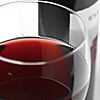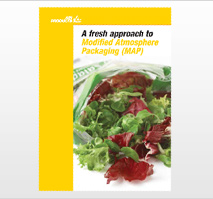Liquid Food and Beverage Products

Food items: Beers, Carbonated Soft Drinks, Ciders, Cordials, Fruit & Vegatable Juices, Lagers, Liqueurs, Liquid Yoghurt, Milk, Mineral Waters, Oils, Spirits, Wines, other items
|
Recommended gas mix
N2 sparging, whereby gaseous N2 is bubbled
through liquid food and beverage products, is
used to reduce dissolved O2 concentrations. Storage temperature Achievable shelf-life |
Principle spoilage organisms and mechanics Other products: yeasts and moulds, Oxidative off-flavours. Food poisoning hazards include Typical MAP machines Typical types of package Examples of typical MAP materials Bulk
|
||||||||||||||||
 The principal spoilage mechanisms affecting perishable
chilled fruit juices, liquid yoghurt, milk and vegetable
juices are microbial growth and physical separation.
Souring is also a principal spoilage mechanism for milk.
Ambient stable beverages, such as beers, carbonated soft
drinks, ciders, cordials, lagers, liqueurs, mineral waters,
wines, and spirits, are also prone to selected microbial
spoilage and some from oxidative off-flavours.
The principal spoilage mechanisms affecting perishable
chilled fruit juices, liquid yoghurt, milk and vegetable
juices are microbial growth and physical separation.
Souring is also a principal spoilage mechanism for milk.
Ambient stable beverages, such as beers, carbonated soft
drinks, ciders, cordials, lagers, liqueurs, mineral waters,
wines, and spirits, are also prone to selected microbial
spoilage and some from oxidative off-flavours.
Perishable chilled fruit juices, liquid yoghurt, milk, and vegetable juices can support the growth of food poisoning bacteria such as Listeria monocytogenes and Staphylococcus aureus. Consequently, it is recommended that strict control over temperature, hygiene and handling be maintained throughout. Liquid food and beverage products are not packed on Typical MAP machines, and the types of package typically used include cartonboard containers, glass and plastic bottles, aluminium and steel cans, kegs, barrels, and stainless steel tanks. N2 and/or CO2 sparging, whereby gaseous N2 and/or CO2 is bubbled through liquid food and beverage products, is used to reduce dissolved O2 concentrations. Such gas sparging is commercially used for carbonated soft drinks, beers, lagers, mineral waters, fruit juices, etc, and could be beneficial for other liquid food and beverage products.




